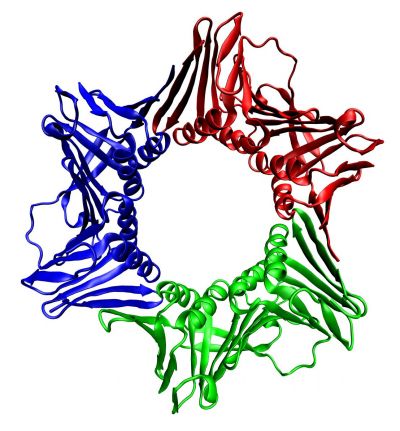Molecular chaperones aid in protein folding

axc tricolor
By Opabinia regalis [GFDL (http://www.gnu.org/copyleft/fdl.html) or CC-BY-SA-3.0 (http://creativecommons.org/licenses/by-sa/3.0/)], via Wikimedia Commons
Proteins assume a complex 3D structure after manufacture in order to achieve their final functionality. Advanced spectroscopic methods shed light on cellular quality control mechanisms with atomic resolution.
Genes code for proteins, the ubiquitous molecules responsible for nearly
everything a cell does and for higher-order functions of an organism in
turn. Misfolding and aggregation are common but, left unattended, can
provoke ageing, disease and cell death. To prevent this, nature has
evolved enzymatic machinery called molecular chaperones.
The molecular chaperones aid in proper folding and play a role in proteolytic degradation of incorrectly folded proteins in an adenosine triphosphate (ATP)-dependent way. ATP is the energy currency of the cell and the molecular machines require a supply of it to do their work. EU-funded scientists used state-of-the-art nuclear magnetic resonance (NMR) spectroscopy to study chaperone-assisted protein (re)folding for the project 'Real-time studies of biological nanomachines in action by NMR' (NANOLIFE@WORK).
Studies aided in understanding the mechanisms of the ATP-induced conformational cycle (repetitive changes in the conformation of the molecular chaperones between various structures). Researchers also provided insight into a passive mechanism of substrate protection by the chaperone and of chaperone-assisted protein folding.
Protein aggregation in the brain is a hallmark of many neurodegenerative diseases, including Alzheimer's and Parkinson's diseases and cystic fibrosis. Understanding how molecular chaperones do their work could point to new therapies for aggregation-related diseases.
NANOLIFE@WORK put important pieces into the puzzle of how molecular chaperones do their jobs and application of results to the health field could have major socioeconomic impact. Further, atomic resolution of molecular machines in motion will have broad-sweeping relevance for advancing structural molecular biology.
published: 2015-05-26

